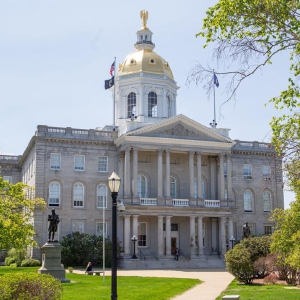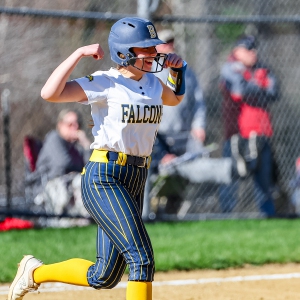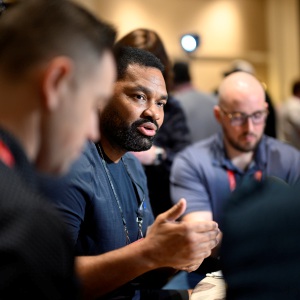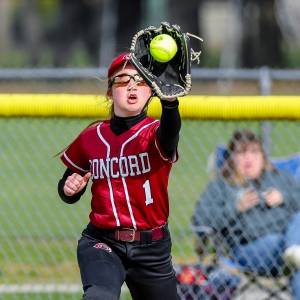Michael McCann answers questions about Name, Image and Likeness
| Published: 01-29-2023 4:24 PM |
In late December, the New Hampshire Interscholastic Athletic Association (NHIAA) adjusted its rulebook to allow high school athletes to be able to capitalize off of their name, image and likeness (NIL) without losing their athletic eligibility. University of New Hampshire law professor and NIL expert Michael McCann recently addressed some common questions and concerns expressed about NIL with the Monitor.
Answers have been edited and condensed. To hear the full conversation, check out last week’s episode of the Monitor Sports Podcast.
Concord Monitor: Why is this significant that this is happening for New Hampshire high schools?
Michael McCann: For a long time, athletes at the amateur level had not been able to sign endorsement deals or be paid and sponsored under the concept of “amateurism.” Because an athlete is an amateur, he or she shouldn’t receive any sort of compensation. For a long time, that’s been a source of controversy because their classmates could be paid for doing other things related to their identity.
There’s also a right we all have as Americans called the right of publicity, which is basically the right that says people have to pay us to use our identity — more specifically, our name, our image, our likeness, if we have a famous signature or famous voice. So it’s sort of inherent as Americans that we should be paid for who we are.
At the youth level, athletes have not been able to be paid, or they lose their eligibility. And that has long been the general rule among the 50 states. But unlike with college sports where there’s the NCAA, high school sports are more state-specific, and state athletic associations decide on their own. And New Hampshire has now joined the group of states that are letting athletes do deals.
CM: This isn’t specific with the NHIAA’s guidelines, but I’ve seen other states that have allowed high school athletes to capitalize on their NIL where they specify that the athlete’s skill level can’t be taken into consideration when these deals are determined. What is the purpose behind that?
McCann: The purpose behind that is in part to prevent what’s called pay-for-play, the idea that the athlete is being paid to join a particular school or stay at that school in exchange for compensation; it’s not their name, image and likeness, they’re actually being paid for their service, their labor, if you will. In that context, the idea is to ensure that none of that is happening, at least under amateurism rules. Now, some could argue that that should be allowed too, but that’s a separate issue. That is one way of trying to mitigate that concern.
Article continues after...
Yesterday's Most Read Articles
 “It’s beautiful” – Eight people experiencing homelessness to move into Pleasant Street apartments
“It’s beautiful” – Eight people experiencing homelessness to move into Pleasant Street apartments
 No deal. Laconia buyer misses deadline, state is out $21.5 million.
No deal. Laconia buyer misses deadline, state is out $21.5 million.
 N.H. Educators voice overwhelming concerns over State Board of Education’s proposals on minimum standards for public schools
N.H. Educators voice overwhelming concerns over State Board of Education’s proposals on minimum standards for public schools
 Matt Fisk will serve as next principal of Bow High School
Matt Fisk will serve as next principal of Bow High School
 High schools: Coe-Brown softball wins 5th straight, Concord’s McDonald pitches first varsity win, Tide’s Doherty scores 100th career point
High schools: Coe-Brown softball wins 5th straight, Concord’s McDonald pitches first varsity win, Tide’s Doherty scores 100th career point
 Construction of housing project in former Church to begin with parking dispute in the rearview
Construction of housing project in former Church to begin with parking dispute in the rearview
CM: One of the things you hear a lot, and this is more specific to the college level, is, “Well, the athletes are getting a free education at whatever university they go to; why should they be allowed to make more money?” What is your response when you hear that?
McCann: Well, they’re getting a free education, but why would that preclude them from being paid by a sponsor? I feel like they’re sort of unrelated. If a local pizzeria wants to pay an athlete because she’s excellent at her sport and she has some local name recognition, the fact that she’s also not paying tuition, I don’t feel like those two are connected points to me. I feel like they’re really separate. Because again, the payer is not the school, it’s some third party.
And also, I think it’s worth noting, most college athletes on scholarships are not getting full rides. That’s the aspiration for many parents, but often the scholarships are nowhere near a full ride. Plus, there are other things that tuition doesn’t cover. There’s all sorts of ways in which the hypothetical of “they’re already getting a free education” either isn’t factually true in its entirety, or even if it’s true, to me, that’s a separate point from whether that athlete can also be paid as other Americans for the use of their identity by third parties.
CM: Bringing it back to New Hampshire high schools, there are some challenges that could arise with this implementation, particularly you could have 14- to 18-year-old kids trying to negotiate deals, and there are chances for something to go wrong. What’re some of those issues that you could see arising, and how would those be addressed?
McCann: This is not new. There are child actors who are much younger than 14 that are paid for their celebrity. Musicians as well. This is not new to the American economy, that there are young people who are exceptional that can be paid to reflect what makes them exceptional.
I think one challenge is that, in many cases, they’re going to be paid small amounts, if anything. And because of that, it’s difficult to justify hiring a lawyer; in some cases, they’ll be paid less than what a lawyer would charge for an hourly rate.
And also, what is expected of the athlete? Do they understand at 15 what they’re signing? Do their parents understand it? A parent might not understand contracts that have all sorts of legal terminology and fiduciary obligations that are worded for people that are lawyers.
CM: Most of these deals, if any happen, would be small-value deals. Especially in New Hampshire, you’re not getting high school kids that are getting tens of thousands or millions of dollars. So I think it’s an important point to make that this adjustment by the NHIAA in its rulebook may have some impact; it may have no impact. But in your view, it doesn’t really matter necessarily the impact. It’s more that this is a right that these athletes should have at their disposal, correct?
McCann: That’s exactly as I would put it. This is about a right. This is probably not a right that will have value for the vast, vast majority of high school athletes. The fact is they’re not marketable. They may be good at a sport, they may be great students, they may be nice people, but they probably don’t have the sort of celebrity power that would command an endorsement. Or, if it’s anything, it’s something really modest: free pizza, 100 bucks, something that’s not life-altering.
This isn’t about people getting rich. This is really about restoring a right they already had, or at least removing a constraint from that right.
CM: And one of those other opportunities is camps. Maybe a kid now, if they’re a good football player at Concord High School, they could say, “Hey, I’m doing this football camp,” and they don’t have to worry about the fact that they could lose their football eligibility.
McCann: That’s right. That really gets at the idea of why this could be pro-educational, that it can create opportunities for older kids – and by older kids I mean teenagers, 14 to 18 – who will paid a little bit to sponsor a camp, so they’re more likely to do it over the summer, make a little money and they could teach younger kids how to play a sport and how to play it well. That, to me, is a good thing for the state, if that’s the setup.
We all know, with name, image and likeness, I think national media sometimes covers it as this is about making young athletes millionaires, but that is not the case in 99.9% of situations. It’s really what you just said: Throw some money at the high school junior who’s really good at his sport to sponsor the camp, and they can teach younger kids how to play. To me, that shouldn’t be controversial. That actually seems like a common-sense thing that should be allowed.


 High schools: Bow’s Kelly lifts Falcon softball to victory in walk-off, more Monday results, plus Saturday’s track meets
High schools: Bow’s Kelly lifts Falcon softball to victory in walk-off, more Monday results, plus Saturday’s track meets Patriots’ draft approach likely to be different in post-Belichick era
Patriots’ draft approach likely to be different in post-Belichick era High schools: Weekend results
High schools: Weekend results
